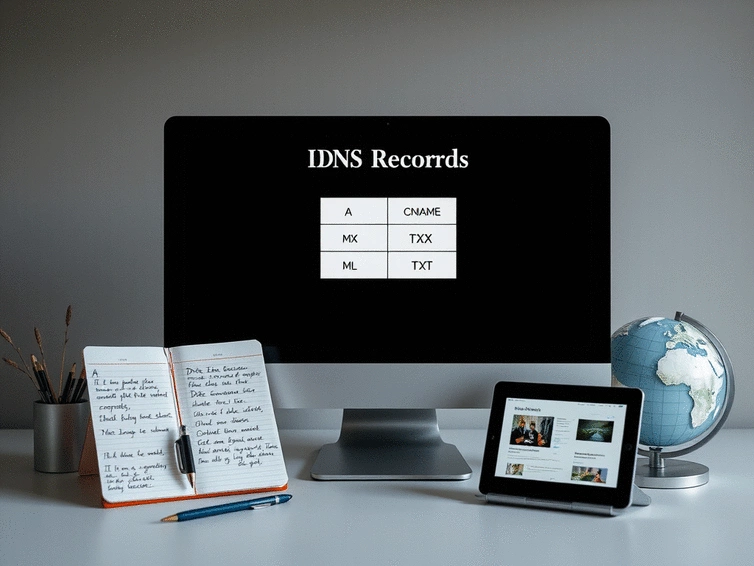
Intro to DNS Records for Beginners
Have you ever wondered how websites connect to your browser with just a simple domain name? The answer lies in the intricate workings of the Domain Name System (DNS), a fundamental aspect of internet functionality that is often overlooked. Let’s uncover the essentials of DNS and its impact on your online presence!
What You Will Learn
- DNS acts as the internet's phonebook, translating user-friendly domain names into IP addresses.
- Key functions of DNS include translation, caching, and load balancing for improved website performance.
- Understanding DNS records like A, MX, TXT, and CNAME is crucial for effective domain management.
- Best practices for managing DNS records involve regular reviews, documenting changes, and securing your domain with specific records.
- Staying informed about DNS developments, such as DNS-over-HTTPS, is essential for enhancing privacy and security online.
The DNS Resolution Process: A Step-by-Step Guide
Understanding how DNS works is crucial for effective online management. This diagram illustrates the journey a domain name takes to become an IP address.
1. User Enters Domain Name
You type "example.com" into your web browser.
2. DNS Resolver Query
Your computer sends a query to a DNS resolver (often your ISP's server).
3. Root Server Referral
The resolver asks a root DNS server for the Top-Level Domain (TLD) server.
4. TLD Server Referral
The TLD server (.com, .org) directs the resolver to the authoritative name server.
5. Authoritative Name Server
This server holds the specific DNS records (like A record) for "example.com".
6. IP Address Returned
The authoritative server sends the IP address of "example.com" back to the resolver.
7. Resolver Caches & Returns IP
The resolver stores the IP (caching) and sends it to your computer.
8. Browser Connects to Server
Your browser uses the IP address to connect to the website's server and load the page.
Building a Foundation: What is the Domain Name System (DNS)?
As you embark on your journey to establish an online presence, it's essential to understand the backbone of the internet: the Domain Name System (DNS). Think of DNS as the internet’s phonebook, translating user-friendly domain names into IP addresses that computers use to identify each other. Without DNS, navigating the web would be a daunting challenge, as we would have to memorize complex numerical addresses instead of simply typing in a domain name. For a deeper dive into the fundamentals, you can refer to resources like Cloudflare's explanation of what DNS is.

At All for Domains, I often see beginners feel overwhelmed by technical terms, but breaking down DNS can help clarify its importance. It's a critical component that ensures smooth communication between users and websites. Understanding how DNS operates is your first step toward effective online management!
Understanding the Role of DNS in Internet Functionality
The primary role of DNS is to ensure that when you type a domain name into your browser, it resolves to the correct IP address, allowing you to access the website. This process happens almost instantaneously, making your internet experience seamless. Here are some key functions of DNS:
- Translation: Converts domain names to IP addresses.
- Caching: Stores recent lookups to speed up future requests.
- Load Balancing: Distributes traffic across multiple servers to improve performance and reliability.
By understanding these roles, you can appreciate how integral DNS is to web functionality. Plus, knowing that it helps balance server load can inform your choices when selecting a hosting provider, ensuring your site remains accessible even during peak times! For more detailed information on DNS functionality, consult comprehensive guides such as NIST Special Publication 800-81-2 on securing DNS.
Key Terminology Related to DNS Records
To navigate the DNS landscape effectively, it helps to know some key terms associated with DNS records. Here’s a quick glossary to get you started:
- DNS Records: Entries in the DNS database that provide information about a domain.
- Resolvers: Servers that translate domain names into IP addresses.
- TTL (Time to Live): The duration that a DNS record is cached before it must be refreshed.
Familiarizing yourself with these terms will prepare you for deeper discussions about managing your domain. At All for Domains, I emphasize the importance of understanding these basics as they lay the groundwork for effective domain and website management. For a basic guide to DNS records and terminology, GoDaddy's resources can be very helpful.
The Importance of DNS Resolvers in Network Communication
DNS resolvers are the intermediaries in the translation process. When you enter a domain name, your computer contacts a resolver, which then queries various DNS records to find the corresponding IP address. Here’s why resolvers matter:
- Efficiency: They streamline the process by caching results for faster access.
- Reliability: Resolver servers usually have backup systems to ensure queries are resolved even during outages.
- Security: Many modern resolvers offer additional protection against phishing and malware.
Understanding the role of DNS resolvers can help you choose reliable DNS services that enhance your website's security and performance. By leveraging the right tools, you can optimize your online presence, which is exactly what I aim to help you achieve at All for Domains!
Pro Tip
Did you know? Utilizing a reliable DNS service can significantly enhance your website's performance and security. By choosing a provider that offers features like DNSSEC (Domain Name System Security Extensions), you can protect your domain from various threats, including spoofing and cache poisoning. Investing in a good DNS service is a small step that can lead to great benefits for your online presence!
Summarizing Key Takeaways on DNS Records
As we wrap up our exploration of DNS records, it’s clear that understanding these components is crucial for anyone looking to establish a strong online presence. DNS records serve as the backbone of your website's functionality, directly influencing how users access your content. From directing traffic to ensuring your emails arrive seamlessly, mastering these records can significantly enhance your website's performance and reliability.
Here are some key takeaways to remember:
- A Records direct users to the correct IP address, ensuring they reach your site.
- MX Records are essential for managing email traffic, making sure your communications are delivered reliably.
- TXT Records play a vital role in verification processes and security measures.
- CNAME Records simplify domain management, especially for businesses with multiple domain names.
Each type of record has its unique function, and knowing how to utilize them effectively can make a significant difference in your online strategy.
Best Practices for Managing Your DNS Records
Managing DNS records doesn't have to be daunting! Here are some best practices I recommend based on my experience at All for Domains:
- Regularly review your records to ensure they reflect your current setup and needs.
- Document changes to track what modifications have been made and when.
- Utilize TTL settings wisely to control how long information is cached, balancing speed and accuracy.
- Secure your domain by implementing SPF, DKIM, and DMARC records to enhance email security.

Incorporating these practices not only secures your domain but also ensures optimal performance for your website.
Future Considerations: Staying Informed About DNS Developments
As technology evolves, so does the landscape of DNS management. It's essential to stay updated on new trends and changes that can impact your online presence. DNS-over-HTTPS (DoH), for example, is gaining traction for enhancing privacy and security. It's vital to keep an eye on developments like these!
Other areas worth following include:
- Advancements in DNS security protocols to protect against increasingly sophisticated threats.
- Changes in regulations regarding domain privacy and WHOIS information.
- Emerging tools that simplify DNS management for users of all skill levels.
By staying informed, you can adapt your strategies and ensure that your domain continues to thrive in a competitive digital landscape.
Your Next Steps in Understanding DNS
Now that you have a solid understanding of DNS records, it’s time to dive deeper! Engaging with tools and resources specifically designed for DNS management will empower you to take full control of your online presence.
Engaging with DNS Management Tools and Resources
There are plenty of tools available to simplify DNS management. I recommend exploring:
- Google Search Console for monitoring DNS health and verifying ownership.
- DNS Checker for verifying record propagation.
- Cloudflare for robust DNS management and added security features.
These tools can help streamline your processes and improve your website's efficiency!
Encouraging Questions and Further Learning in DNS
Don’t hesitate to reach out with questions! DNS can be complex, and I’m here to help you navigate through any challenges you face. Engaging in forums, reading articles, or even joining workshops can enhance your understanding further. Share your experiences, and let’s learn together!
Exploring Domain Transfers and WHOIS Privacy Options
Lastly, if you're considering switching providers or purchasing additional domains, it's crucial to understand the implications of domain transfers. WHOIS privacy options can also protect your personal information, which is an important consideration for any online entrepreneur.
Make sure to review your options and choose a provider that aligns with your needs and values. Remember, at All for Domains, we're dedicated to guiding you through every step of your online journey! Let's make your vision a reality!
Frequently Asked Questions About DNS
- What is DNS?
- DNS (Domain Name System) acts as the internet's phonebook, translating human-readable domain names (like "example.com") into numerical IP addresses that computers use to identify each other and locate websites.
- How does DNS work?
- When you type a domain name into your browser, your computer queries a DNS resolver. This resolver then communicates with root, TLD, and authoritative nameservers to find the corresponding IP address. Once found, the IP address is returned to your computer, allowing your browser to connect to the website's server.
- What are the key functions of DNS?
- The key functions of DNS include translation (domain names to IP addresses), caching (storing recent lookups for faster access), and load balancing (distributing traffic across multiple servers for improved performance and reliability).
- What are some important types of DNS records?
- Important DNS record types include A Records (map domain names to IP addresses), MX Records (handle email routing), TXT Records (used for verification and security), and CNAME Records (redirect one domain to another).
- Why is it important to manage DNS records properly?
- Proper DNS record management ensures your website is accessible, emails are delivered correctly, and your domain is secure. Best practices involve regular reviews, documenting changes, utilizing TTL settings wisely, and implementing security records like SPF, DKIM, and DMARC.
Recap of Key Points
Here is a quick recap of the important points discussed in the article:
- DNS translates user-friendly domain names into IP addresses, enabling seamless web navigation.
- Key functions of DNS include translation, caching, and load balancing for performance and reliability.
- Understanding DNS records like A, MX, TXT, and CNAME is crucial for effective domain management.
- Best practices for managing DNS records include regular reviews, documentation of changes, and securing your domain with appropriate records.
- Staying informed about DNS developments and tools can enhance your website's security and performance.





Domain Management Tools You Need
Understanding Web Hosting Hidden Costs
Understanding Uptime Guarantees in Hosting
Understanding Domain Names and SEO
Competitor SEO Analysis Made Simple